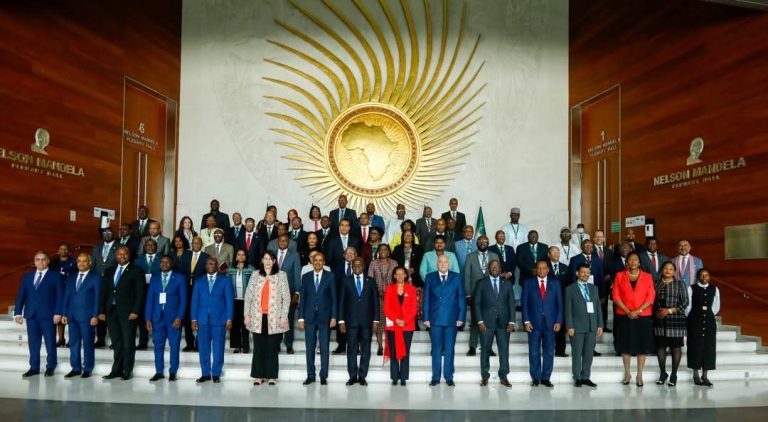AU Executive Council Meets in Addis Ababa to Advance Continental Unity, Self-Reliance, and Institutional Reform
Edited by : Africa Eye
The 24th Extra-Ordinary Session of the Executive Council of the African Union opened today at the organization’s headquarters in Addis Ababa, Ethiopia, gathering Ministers of Foreign Affairs and heads of delegations from AU Member States to discuss key institutional, economic, and security priorities.
The session was presided over by Tete Antonio, Minister of External Relations of Angola and Chairperson of the Executive Council. It was held in the presence of the AU Commission leadership, diplomatic corps, AU organs and missions, as well as representatives of the host country, Ethiopia.
The Chairperson of the AU Commission, Mahmoud Ali Youssouf, emphasized the importance of strengthening internal financial capacities across the continent. The Executive Council reiterated the need for African countries to reduce reliance on external funding and called for the full implementation of the African Continental Free Trade Area (AfCFTA) as a pathway toward deeper economic integration. Removing trade barriers and facilitating guided trade among member states were highlighted as priorities to boost intra-African commerce.
Attention was also given to issues concerning health, food security, and the engagement of the private sector. Delegates underlined the necessity of enhanced domestic investment and collaboration with philanthropic organizations to bridge development financing gaps. The AfCFTA and its associated mechanisms were recognized as strategic tools for transforming structural challenges into opportunities for inclusive growth.
In terms of peace and security, the Council acknowledged persistent instability across several regions of the continent. It reaffirmed the need for Africa to develop autonomous mechanisms for Peace Support Operations (PSOs) and to strengthen its contribution to global peace efforts. The importance of coherent, united African action in the face of evolving crises was underscored throughout the proceedings.
Ethiopia, as host of the AU headquarters, reiterated its commitment to supporting the work of the Union and facilitating the effective fulfillment of its institutional mandates.
The outcomes of this session are expected to include decisions related to the election of two remaining Commissioners—those responsible for Education, Science, Technology and Innovation (ESTI), and for Economic Development, Tourism, Industry and Minerals (ETTIM)—as well as resolutions concerning the Peace and Security Council and other AU agencies. This session is seen as a key moment in advancing the Union’s long-term vision of integrated development, institutional reform, and continental autonomy.
-

Kenya Faces Environmental Fallout from Second-Hand Clothing Surge
Edited By : Tendai ZolaEvery month, nearly 500 containers stuffed with second-hand clothing arrive in Kenya, offloaded at Mombasa port... Society -

Tragedy at Sea: Over 140 Ethiopian Migrants Presumed Dead in Yemen Shipwreck
Edited By: Tendai Zola A boat carrying 154 Ethiopian migrants capsized early Sunday off the coast of Yemen, leaving at least... Human Rights -

East Africa Makes History as Kenya, Tanzania, and Uganda Co-Host CHAN 2024
Edited By : Widad WAHBI For the first time since 1976, East Africa is hosting a major CAF tournament. The 2024... Sports -

DRC President Tshisekedi Launches Campaign to Recognize “Genocide” in Eastern Congo
Edited By: Widad WAHBI Democratic Republic of Congo President Félix Tshisekedi has called on the country’s parliament to officially recognize the... Human Rights -

West Africa: A Legislative Bridge Rises Across the Mano River
Edited by: Fatima BabadinIn a bold stride toward regional integration, Sierra Leone, Liberia, Côte d’Ivoire, and Guinea have formally launched... West Africa - Sahel -

Kenya Emerges as a New Home for African-American Expats Seeking Roots and Freedom
Edited By: Tendai Zola An increasing number of African Americans are choosing to leave the United States and settle permanently on... Society

 Follow the latest news on WhatsApp
Follow the latest news on WhatsApp  Follow the latest news on Telegram
Follow the latest news on Telegram  Follow the latest news on Google News
Follow the latest news on Google News  Follow the latest news on Nabd
Follow the latest news on Nabd 

















